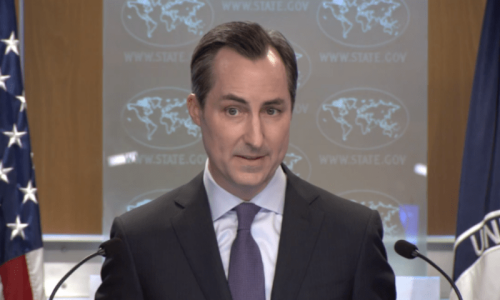Pakistan calls back envoy to India 'for consultations' after harassment of diplomats in Delhi
In light of repeated incidents of harassment of Pakistani diplomats at the hands of Indian authorities in the Indian capital, Islamabad has called back Pakistan's High Commissioner to New Delhi "for consultations", Foreign Office Spokesperson Dr Muhammad Faisal said at a weekly press briefing on Thursday.
Incidents of harassment of Pakistani diplomats and their families that are posted in India have emerged recently, with unidentified people chasing and clocking a car carrying the children of a counsellor just this week. The children were allegedly filmed and photographed for 40 minutes, leaving them traumatised.
Details here: FO lodges protest over harassment of Pakistani diplomats, families in Delhi
The FO on Tuesday had summoned a senior Indian diplomat to protest the continued harassment, accusing Indian authorities of complicity as, despite providing evidence of such incidents to India's Foreign Ministry, "no positive action" had been taken as yet.
Dr Faisal during today's briefing said that deliberate maltreatment of diplomats and their families by India is not confined to single event and continues unabated despite Pakistan's protest, Radio Pakistan reported.
He insisted that Pakistan would go to 'any lengths' to ensure the safety of its diplomats posted abroad. "The security of our diplomats is paramount, and Pakistan will take every step in this regard," he said.
The FO spokesperson also warned India against "political point-scoring" through playing "the Pakistan card in its domestic politics."
Dr Faisal claimed that political parties in Pakistan did not use anti-India sentiment during their election campaigns and urged Indian politicians to follow suit. Although the general election in India is due early next year, political parties and players are already forming alliances and strategies in the run-up to 2019.
Hardline Indian Prime Minister Narendra Modi, a member of the right-wing Bharatiya Janata Party, who was elected in 2014 has the highest personal approval ratings currently, according to the Times of India, with nearly 90 per cent of Indians holding a favourable opinion of him.
However, analysts have warned that the snatching away of a handful of seats from the BJP ─ which currently rules 21 of India's 29 states ─ by opposition parties in by-polls last year, may be an indication that anti-incumbency may factor into the next Indian general election.













































